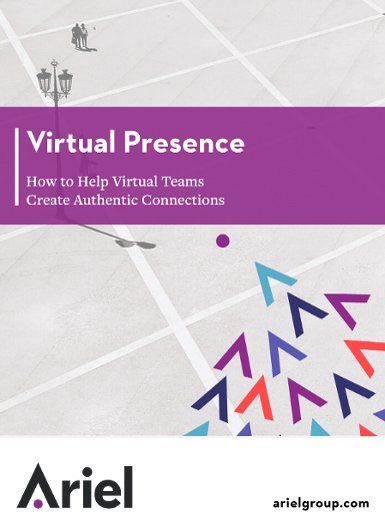LIVE BLOGGING FROM ATD: Simon Sinek’s Keynote

If we are convinced we cannot trust our coworkers, we might not be able to solve complex problems. But if we trust one another and want to work together, we can accomplish remarkable things.
What is a Leader?
Simon Sinek began his keynote address to the audience assembled at #ATD2016 by asking that very question: What is your definition for the word “leader?”
The reality is, as human beings, we don’t have a good standardized definition for what a leader is. Some people think it means being in charge. Others think it means being number one. Some would argue it means taking care of others. Across cultures, a leader is still an objective definition that is based on who we are as people, and the context of the situation — and situations can make all the difference.
We’re Social Animals
By nature, we are social animals and we respond to the environment we’re in. If you put a good person in a bad environment, they are more likely to engage in bad behavior. Likewise, if you put a bad person in a good environment, they may rise to the occasion and turn their life around.
When you get environment right, an amazing thing takes place: trust and cooperation just show up. When you get the environment wrong, well, bad things will result.
Trust and cooperation are feelings. We know it in our guts if we trust you or not. And, as a result, we know whether or not we want to work together with you on a project.
Think of how this applies in the workplace. If we are convinced we cannot trust our coworkers, we might not be able to solve complex problems. But if we trust one another and want to work together, we can accomplish remarkable things.
According to Sinek, this goes back to the very nature of our biology. As cavemen, when we felt safe among our own, we would cooperate. We’d take turns keeping watch from approaching predators or warn about a change in weather. But if we did not feel safe among our tribe, trust and cooperation wouldn’t exist. Instead, our ancestors would respond with cynicism, mistrust, paranoia, and self-interest.
The World Is Still Unsafe – But You Can Protect Yourself Internally
While you may not be trying to outrun a saber-toothed tiger, the modern world still has its dangers: the economy, competitors who are hell bent on putting you out of business, or the new hire who is already gunning for your job.
If we need trust and cooperation to survive, the only variable to creating those conditions happens inside the organization. You can’t control what your competitors do or how the economy responds to the day’s market. What you can control is how your employees engage with one another.
Do you have managers whose looks strike fear into the heart of employees, constantly checking to see if they’re doing everything right and haven’t made a mistake? Or, do you have managers who walk the halls and ask your employees how they are and how they can improve their lives at work?
Here’s the secret: if you get good leadership, you can get trust and cooperation.
Think about the two questions above. In the first scenario, employees feel that their managers do not trust them to do the job for which they were trained. Micromanagers, as they are known, don’t create a sense of cooperation.
In the latter example, employees feel like the leaders have their backs. They are looking out for employees’ self-interests before their own. And that’s the mark of a great leader.
The Importance of the “Why”
Have you ever asked your employees why they come to work? Or why they choose this career over the next?
Many companies rely on metrics to make employees feel like they are progressing. We work towards sales goals, aim to complete projects by a certain date, and teams try to sell 1,000 units of a new product.
Is that why your employees come to work? No. Metrics don’t provide a destination. Companies need to have their sights set on a vision. And this specific vision is the “why.”
Imagine empowering employees who work in sports. The goal may be to sell out 50% of the games in a given season. The vision may be to give fans such a sensational experience that others will see the pride in the team and you’ll “paint your town in the teams’ colors.”
The vision allows you to picture the destination. All of the work you do is contributing to something bigger than yourself.
How to Build the Best Workplace Environment
Now that you have a vision, can you, as the leader, generate the right conditions that will allow your employees to feel safe – and therefore cooperate with one another?
Simon Sinek reminded us of four hormones found in the brain: endorphins, dopamine, serotonin, and oxytocin. Leadership, he says, can be found in the latter two.
To build a successful workplace environment, businesses need to avoid releasing endorphins and dopamine. Endorphins respond to certain stimuli, which include stress and fear. Despite the small “high” they get from accomplishing an anxiety-filled task, the reality is that it doesn’t last. The next task will bring along just as much stress if not more.
Dopamine
Dopamine is the reason we are accomplishment machines. If we are left unbalanced, dopamine can be highly addictive.
An unhealthy corporate culture can result if the primary means in which the organization gets performance is through bonuses. Many financial businesses do this, offering their employees big rewards for hitting their individual metrics.
But, as mentioned earlier, metrics only give people a number. And, as a result, employees no longer buy into whatever vision was once presented to them. They beg, borrow, and steal to get their next hit of dopamine. The only happiness they feel is making the numbers.
Serotonin
Serotonin is the leadership chemical. It is the feeling of pride and status. Remember, we are social animals and want to be recognized by our tribe. When employees get publicly recognized, they feel more valued and valuable.
Think about a pride of lions. In the wild, the alpha male gets to eat first and get his first choice of a mate. The instinct is to have your best lion strong and healthy to protect the pride from danger. Moreover, his genes are strong and the offspring should make the group stronger.
While the workplace isn’t as wild, we have the same instincts. We still judge each other and give preferential treatment to our alphas. We recognize their contributions in making the company stronger. And even though they get these advantages (the corner office, a higher salary), there is an important trade-off. When danger threatens the company, there is an expectation that the smarter, stronger person will go and protect us. The alpha will ensure that business doesn’t fail.
Fundamentally, this is what it means to be a leader. Our livelihoods are still in the alpha’s hands. While there may not be a predator attacking our young, theoretically, employment with a successful company is. An alpha lion will fight the battle himself and protect the other lions. Not once will the plan be to give the predator one of the cubs.
And in times of danger and chaos, most of us can clearly identify leaders.
Think about past economic hardships. In 2008, banking leaders allowed their own people to be sacrificed in order to protect their bonuses and money. Some companies today still use human beings to balance the books. In other words, the alpha lion allowed the predator to get to the cubs so he could have more food for himself. It doesn’t make sense in nature, and it doesn’t make sense in business.
True leaders put the lives of others ahead of their own. And true leaders aren’t in charge; they take care of those in their charge.
When employees feel that their leaders have their backs, they will take care of themselves, they will take care of the company, and they will take care of each other.
Oxytocin
Oxytocin is the feeling of love and loyalty. Oxytocin bonds us to each other.
When we are in the company of our friends, we release oxytocin and it makes us feel safe. As cavemen, we felt safe in our tribe. We were near the people we trust.
If a company breeds mistrust and self-interest, oxytocin will not be released. Trust won’t exist. Business is essentially human beings who are dealing with other human beings that make us feel safe. We go into relationships with salespeople who we trust, not those who we feel are taking us for a ride.
If we want to release more oxytocin, the prescription is simple: have more kindness and generosity in the workplace. While this isn’t a metric you can measure in a bonus, it is something that will propel business forward.
Put a premium on those who give away a nonredeemable quality. Did you witness a team member assist another to make a deadline? Did you see someone freely give their time and energy to another?
Believe it or not, witnessing an act of kindness and generosity feels good. Like the cavemen, human beings want to look out for one another and keep others safe. When we see kindness, our body’s respond and the dose of oxytocin inspires us to pay it forward to someone else.
Leadership is a Choice
Do your employees love their jobs? Do they feel safe in the environment your company has created? Or are they always on high alert and wary of approaching danger?
Find ways to infuse trust and cooperation into the workplace.
Remember, if your employees take care of each other, you will be able change the world and get closer to that remarkable vision.
